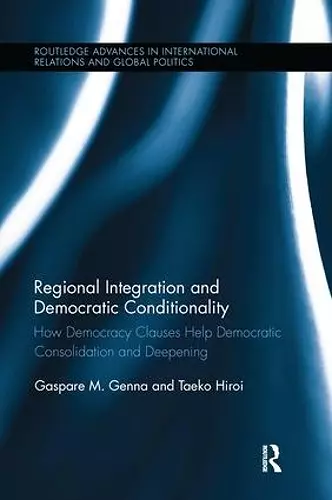Regional Integration and Democratic Conditionality
How Democracy Clauses Help Democratic Consolidation and Deepening
Gaspare M Genna author Taeko Hiroi author
Format:Paperback
Publisher:Taylor & Francis Ltd
Published:18th Nov '16
Currently unavailable, and unfortunately no date known when it will be back
This paperback is available in another edition too:
- Hardback£150.00(9781138813397)

How effective are democracy clauses of regional integration organizations (RIOs) in promoting democratization and democratic consolidation among member-states? RIOs are increasingly adopting "democracy only" clauses in their treaties, requiring democracy and political stability as a condition of membership. Stable democracy is a collective good for RIO members; without political stability, uncertainty regarding economic exchange increases, undermining the promise of integration. The presence of powerful countries may be necessary for the RIOs to legalize democratic conditionality.
In this book, the authors argue that once established democracy clauses exert an independent influence in promoting and defending democratic norms and institutions within the member-states by increasing the transparency and credibility of democratic commitment and sanctions for violation. The findings based on the analysis of 40 RIOs around the world and in-depth analysis of the European Union, the Common Market of the South, and the Economic Community of West African States indicate that RIO democracy clauses help prevent democratic backsliding and coups and stimulate democratization and consolidation.
With its global scope, originality, and theoretical rigor, this is the first book to catalogue democracy clauses adopted by RIOs worldwide with a thorough analysis of their effectiveness.
"The goal of regional organizations to reduce uncertainty in international relations has been irregular worldwide and remains a puzzle for scholars. Lack of democracy and transparency are only two faces of international uncertainty, which have motivated scholars to explain how regional organizations can incentivize states to enhance and consolidate democracy. Genna and Hiroi contribute to this debate with an extensive research on how forty regional organizations play or not a significant role in providing elements to support democracy, particularly through the use of democratic conditionality. This is a highly recommended reading on comparative regionalism."—Roberto Dominguez, Suffolk University.
"Regional organizations have increasingly introduced "democracy clauses", making membership conditional on promises to abide by democratic political competition and practices. Existing scholarship tends to focus either on selected successful end outcomes or the likely limitations of such clauses, and as a result we know little about when and how democracy clauses actually can change the incentives of actors. This book takes a comparative approach, looking at a large number of regional organizations and member constellations, and highlighting variation to identify causal mechanisms. The authors find that regional organizations can play an important role in enhancing democracy through transparency and sanctions when member states face potential challenges to democracy and a capable state willing to lead. The book is an important addition to research on the international context of democratic institutions."—Kristian Skrede Gleditsch, University of Essex & Peace Research Institute Oslo (PRIO).
"The goal of regional organizations to reduce uncertainty in international relations has been irregular worldwide and remains a puzzle for scholars. Lack of democracy and transparency are only two faces of international uncertainty, which have motivated scholars to explain how regional organizations can incentivize states to enhance and consolidate democracy. Genna and Hiroi contribute to this debate with an extensive research on how forty regional organizations play or not a significant role in providing elements to support democracy, particularly through the use of democratic conditionality. This is a highly recommended reading on comparative regionalism."—Roberto Dominguez, Suffolk University.
"Regional organizations have increasingly introduced "democracy clauses", making membership conditional on promises to abide by democratic political competition and practices. Existing scholarship tends to focus either on selected successful end outcomes or the likely limitations of such clauses, and as a result we know little about when and how democracy clauses actually can change the incentives of actors. This book takes a comparative approach, looking at a large number of regional organizations and member constellations, and highlighting variation to identify causal mechanisms. The authors find that regional organizations can play an important role in enhancing democracy through transparency and sanctions when member states face potential challenges to democracy and a capable state willing to lead. The book is an important addition to research on the international context of democratic institutions."—Kristian Skrede Gleditsch, University of Essex & Peace Research Institute Oslo (PRIO).
ISBN: 9781138287211
Dimensions: unknown
Weight: 294g
186 pages